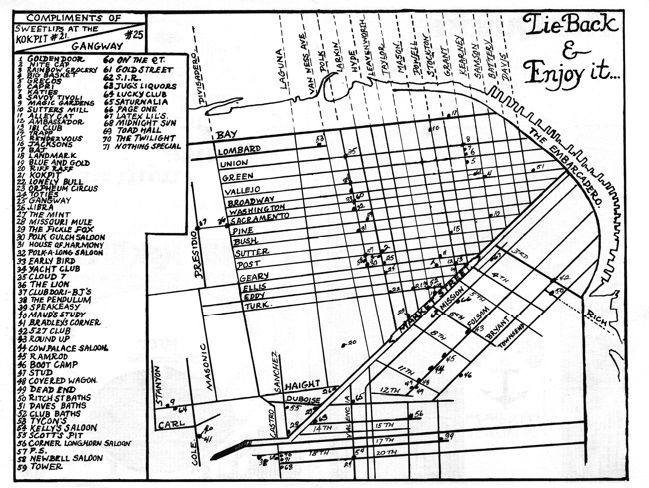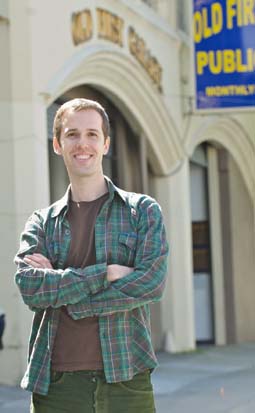Difference between revisions of "Polk Street"
| (10 intermediate revisions by 2 users not shown) | |||
| Line 1: | Line 1: | ||
[[Image:border.jpg]] | [[Image:border.jpg]] | ||
| + | |||
| + | |||
| + | == Index for "Polk Street: Lives in Transition" == | ||
| + | |||
| + | “Polk Street: Lives in Transition” examines Polk Street’s history through the lens of neighborhood change in the mid-2000s. Polk Street was San Francisco’s premiere gay male center in the 1960s and 1970s. The residential enclave and business district provided fertile ground for the development of gay economic and political power. | ||
| + | |||
| + | |||
| + | Its bloc of middle-income gay businesses evaporated in the late 1970s, leaving a “blighted” area known for its underground sex work and drug economy. During these decades, Polk Street served as a home, refuge, and family for queer runaway and homeless youth, often fleeing abusive or unwelcome homes; immigrants, primarily from Asia and Latin America; and, increasingly in the 1990s, lower-income transgendered women and seniors. | ||
| + | |||
| + | |||
| + | Since the early 2000s, a citywide building boom, skyrocketing rents in the central city, and increases in permanent housing for the formerly homeless have pushed and pulled new actors to the area. Tension, bitterness, and misunderstandings now accompany the changes, with the vestiges of a once thriving queer community competing with new businesses and residents for prized territory in the urban landscape. | ||
| + | |||
| + | |||
| + | In an effort to better understand the actions and attitudes of Polk Street denizens, we present personal histories from stake-holders who are living through and shaping these changes. | ||
| + | |||
| + | |||
| + | |||
| + | "Saving People" [click on link for audio] | ||
| + | |||
| + | * [[River Sims]], street priest and outreach worker. | ||
| + | * [[Bill Campbell]], co-founder of Larkin Street Youth. | ||
| + | * [[Megan Rohrer]], minister and Executive Director of nonprofit serving the homeless. | ||
| + | * [[Donna Saffiati]], needle exchange outreach worker. | ||
| + | |||
| + | |||
| + | "The litter of a changing economy" [click on link for audio] | ||
| + | |||
| + | * [[Megan Rohrer]], minister and Executive Director of nonprofit serving the homeless. | ||
| + | * [[Dan Diez]], Lower Polk Neighbors member and retiree. | ||
| + | * [[Corey Longseeker]], artist and Polk Street resident. | ||
| + | |||
| + | |||
| + | "A hustler bar becomes a church" [click on link for audio] | ||
| + | |||
| + | * [[James Beales and David Kapp]], managers of Deco Lounge. | ||
| + | * [[Ron Case]], co-founder of Lower Polk Neighbors. | ||
| + | * [[Wilfried and Ken]], key figures at Polk Street church. | ||
| + | * [[Myles O'Reilly]], owner of O'Reilly's Holy Grail. | ||
| + | |||
| + | |||
| + | "We Are Family" [click on link for audio] | ||
| + | |||
| + | * [[Alexis Miranda]], manager of Divas bar and 33rd Empress of the Imperial Court. | ||
| + | * [[Shane "Yoyo" Gibson]], resident of Polk Street SRO hotel. | ||
| + | * [[Kevin "Kiko" Lobo]], bouncer at Deco Lounge. | ||
| + | * [[Cecilia Chung]], Chair of Human Rights Coalition. | ||
| + | * [[Coy]], former bouncer and local activist. | ||
| + | |||
| + | |||
| + | |||
| + | |||
| + | [[Image:border2.jpg]] | ||
| Line 47: | Line 99: | ||
[[Epilogue: the Rise and Fall of a Polk Street Hustler]] | [[Epilogue: the Rise and Fall of a Polk Street Hustler]] | ||
| − | |||
| − | |||
| − | |||
| − | |||
| − | |||
| − | |||
| − | |||
| − | |||
| − | |||
| − | |||
| − | |||
| − | |||
| − | |||
| − | |||
| − | |||
| − | |||
| − | |||
| − | |||
| − | |||
| − | |||
| − | |||
| − | |||
| − | |||
| − | |||
| − | |||
| − | |||
| − | |||
| − | |||
| − | |||
| − | |||
| − | |||
| − | |||
| − | |||
| − | |||
| − | |||
| − | |||
| − | |||
| − | |||
| − | |||
| − | |||
| − | |||
[[Image:Sweetlips.jpg|frame|none|San Francisco gay bar map. c. 1970s. Courtesy of Coy Ellison.]] | [[Image:Sweetlips.jpg|frame|none|San Francisco gay bar map. c. 1970s. Courtesy of Coy Ellison.]] | ||
| − | |||
| − | |||
Curator biography: [[Image:JoeyPlaster.jpg|thumb|Joey Plaster.]] | Curator biography: [[Image:JoeyPlaster.jpg|thumb|Joey Plaster.]] | ||
| − | Joey Plaster is | + | Joey Plaster is an independent public historian, radio producer, and freelance journalist living in the San Francisco Bay Area. Joey is the recipient of the 2010 Allan Bérubé Prize for outstanding work in public GLBT history, awarded by the American Historical Association’s Committee on LGBT History. He directed the [http://www.glbthistory.org/PolkProject/index.html/ Polk Stories Project] and works closely with San Francisco's GLBT Historical Society. <comments /> |
Latest revision as of 23:43, 25 August 2010
Index for "Polk Street: Lives in Transition"
“Polk Street: Lives in Transition” examines Polk Street’s history through the lens of neighborhood change in the mid-2000s. Polk Street was San Francisco’s premiere gay male center in the 1960s and 1970s. The residential enclave and business district provided fertile ground for the development of gay economic and political power.
Its bloc of middle-income gay businesses evaporated in the late 1970s, leaving a “blighted” area known for its underground sex work and drug economy. During these decades, Polk Street served as a home, refuge, and family for queer runaway and homeless youth, often fleeing abusive or unwelcome homes; immigrants, primarily from Asia and Latin America; and, increasingly in the 1990s, lower-income transgendered women and seniors.
Since the early 2000s, a citywide building boom, skyrocketing rents in the central city, and increases in permanent housing for the formerly homeless have pushed and pulled new actors to the area. Tension, bitterness, and misunderstandings now accompany the changes, with the vestiges of a once thriving queer community competing with new businesses and residents for prized territory in the urban landscape.
In an effort to better understand the actions and attitudes of Polk Street denizens, we present personal histories from stake-holders who are living through and shaping these changes.
"Saving People" [click on link for audio]
- River Sims, street priest and outreach worker.
- Bill Campbell, co-founder of Larkin Street Youth.
- Megan Rohrer, minister and Executive Director of nonprofit serving the homeless.
- Donna Saffiati, needle exchange outreach worker.
"The litter of a changing economy" [click on link for audio]
- Megan Rohrer, minister and Executive Director of nonprofit serving the homeless.
- Dan Diez, Lower Polk Neighbors member and retiree.
- Corey Longseeker, artist and Polk Street resident.
"A hustler bar becomes a church" [click on link for audio]
- James Beales and David Kapp, managers of Deco Lounge.
- Ron Case, co-founder of Lower Polk Neighbors.
- Wilfried and Ken, key figures at Polk Street church.
- Myles O'Reilly, owner of O'Reilly's Holy Grail.
"We Are Family" [click on link for audio]
- Alexis Miranda, manager of Divas bar and 33rd Empress of the Imperial Court.
- Shane "Yoyo" Gibson, resident of Polk Street SRO hotel.
- Kevin "Kiko" Lobo, bouncer at Deco Lounge.
- Cecilia Chung, Chair of Human Rights Coalition.
- Coy, former bouncer and local activist.
Index for Polk Street: A Study of Transitions
The buck has always been the bottom line on San Francisco's Polk Street, a coveted bloc of central city space long zoned by the City as a commercial corridor. The economic principles that would help create a gay neighborhood in the late 1950s -- and facilitate the growth of gay economic, social, and political strength -- would also lead to its demise by the early 2000s. This essay is not a comprehensive history of Polk Street. Instead, it is an attempt to trace the street’s primary economic shifts over the past sixty years in the context of both a changing city and GLBT political center.
1960s to 1970s: Polk Street Emerges as a Gay Economic Engine
- "Mom and Pop" to Gay Mecca
- A Citywide Blue-collar Economy Evaporates
- Blue-collar Heterosexual Taverns and Restaurants “Turn Gay”
- The Tavern Guild and Imperial Court
- Commercialized Sex and Economic Uplift
- Economic Power to Political Power
1960s to 1970s: Queer Sex Work Zones Shift
- Market Street and Union Square Sex Work Economies
- Redevelopment Displaces Sex Work Economies
- “Trade” Sex Work Moves to Polk Street
- Polk Street Merchants Push Back
- Police sweeps to social service
Late 1970s to 1990s: Polk Street Sex Work Economy
- Polk Street Gay Commercial Health Undermined
- Gay Bars “Turn Hustler”
- A Polk Street Sex Work Economy
- Sex Work Economy Breaks Down
- Dynamics of Polk Street Sex Work Change
- Polk Street Homelessness
Late 1990s-2008: Dot.com Boom and “Gentrification”
- Dot.com Boom
- “Bottom feeder” Bars to Upscale “Metrosexual” Bars
- Vestiges of Economy: Polk Street Homelessness
Epilogue: the Rise and Fall of a Polk Street Hustler
Curator biography:
Joey Plaster is an independent public historian, radio producer, and freelance journalist living in the San Francisco Bay Area. Joey is the recipient of the 2010 Allan Bérubé Prize for outstanding work in public GLBT history, awarded by the American Historical Association’s Committee on LGBT History. He directed the Polk Stories Project and works closely with San Francisco's GLBT Historical Society. <comments />



